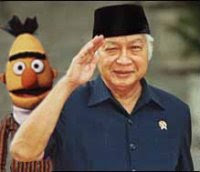Indonesia is 68 years young
Indonesia
is into its silver-haired years and celebrated its sixty-eighth Independence Day
last August 17. The last few Independence Day celebrations have fallen during
the fasting month of Ramadan and have thus been somewhat muted affairs as a
consequence. Hari Merdeka (Freedom
Day) emerges out the other side of the religious tunnel in all of its glory
this year however and promises to be the riot of colour, noise, fun and games
that Indonesians know and enjoy so much.
Indonesian
independence was officially proclaimed at 10am on Friday, August 17, 1945. The
1945 Proclamation of Independence (Proklamasi
Kemerdekaan) was signed by Sukarno and Mohammad Hatta, who were appointed
President and Vice-president the following day. This declaration was only the
start though, the beginning of a long campaign of diplomacy and armed resistance
that finally culminated in the country's colonial masters, the Dutch,
officially acknowledging Indonesia's independence in 1949.
The
Proclamation of Independence had been carefully prepared and planned a few
months earlier, however the whole thing was hastily brought forward to August
17 as a consequence of Japan 's
unconditional surrender to the Allies following the nuclear attack on Nagasaki
These
days, the country's Independence Day is still celebrated with great enthusiasm
all across the Archipelago. Red and white flags are sold weeks in advance,
decorations are put up at private offices and government buildings, political
journalists churn out op-eds about the country's progress over the decades and
the challenges that lie ahead in the future, neighbourhood associations and
organisations plan special events and parties, TV shows get all historical and
school kids have a general whale of a time.
Games
are enjoyed at street parties across the country too and include krupuk (cracker)
eating contests, three-legged races, tasty snacks, decorated floats and plenty
of general tomfoolery. The best-known Independence Day game though is called panjat pinang and involves competitors
attempting to scale slippery, specially greased poles and palm trees in order
to reach prizes which hang suspended from their tops.
Meanwhile,
up at the Presidential Palace, the big man himself delivers a State of the
Nation address and is present at a solemn flag-raising ceremony attended by the
military, all of whom have polished their shoes and buttons to an extra
dazzling patriotic shine for the occasion. If you are really looking to
experience Independence Day in full swing, then head up to the National Monument
(Monas) and the adjacent palace and witness August 17 in its full pomp and
circumstance.
If
you're not too keen on dragging yourself all the way up there, then just take a
stroll around your local neighbourhood and soak in the fun sights, sounds and
indeed tastes of Freedom Day. One important piece of advice though, don't leave
it too late. One of the things perhaps most worthy of admiration about this
country is the ability of its citizens to get up at the crack of dawn or even
earlier and the August 17 fun tends to be over by lunchtime.
So,
tempting as it may be to enjoy a lie in on this national holiday (especially
this year, as Independence Day falls on a Saturday morning after a potentially
heavy Friday night), we would encourage you to set your alarms and join in the
fun. You won't regret it.
Just
what does August 17 mean to Indonesians these days though? Well, I thought that it
would prove instructive to head out onto the streets with my trusty dictaphone
and ask a few people for their views.
Starting
at the higher end of the social spectrum, one young professional told me,
"I'm not sure if Independence Day has the same significance that it once
did for people. I think that Indonesians are more uncertain about the country
now and about the different forces that are competing as we head into the
future. Also, people have a greater access to information now in this digital
age and this also is eroding people's perhaps rather one-dimensional,
simplistic sense of nationalism."
Highfalutin
stuff for sure. Another of my interlocutors, a Miss Weni, told me that, "Of
course Independence Day is important but in 68 years, Indonesia has not really
been able to develop itself to the level that it could reach as a nation,
largely due to misuses of power I believe."
Later
that day, my motorcycle taxi driver told me that, "The kids still love the
games and it's good fun to have a national day but I think that people are more
suspicious of their government these days."
And
the ambivalence continued as I headed into my local minimart for some liquid
refreshment, where a customer that I quizzed about Indonesian independence
informed me that, "We should remember our struggles for freedom, as there
are those in the country today who are sowing the seeds of conflict, division
and religious intolerance."
So
there we have it. A small cross-section admittedly but clearly feelings of
nationalism seem somewhat tinged by nervousness and uncertainty here in 2013,
68 years into the great Republic of Indonesia project. This is probably a
reflection of an economic boom that is still masks weak and corrupt political
institutions, underdeveloped human resources and infrastructure, persistent
poverty and a poor education system. Whether the country will improve after
next year's presidential election will depend on who is elected. Fingers
crossed for 2014 folks.




